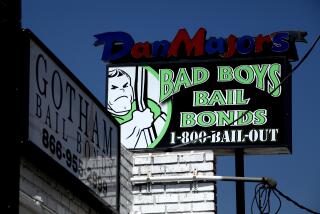The Need for Plea Bargains
- Share via
Without plea bargains, the criminal justice system in Orange County would grind to a halt. That is one reason the latest interruption in the process of making criminal defendants an offer they can’t refuse is unlikely to last long.
Dist. Atty. Michael R. Capizzi has long said he will not let his prosecutors enter into the plea-bargaining process. This month, it was disclosed that a judge in Municipal Court in Westminster said that if prosecutors will not be part of the process, neither will he. Other judges in Westminster have followed suit. As a result, plea bargaining has stopped, and cases that would have been settled quickly have been passed up the ladder to Superior Court, slowing things there.
The judges have declined to say why they are acting now. But over the years, some have expressed displeasure with Capizzi’s proclaimed stance that he will not allow plea bargains unless they are done in public--knowing that is unacceptable to defense lawyers. Fortunately, the reality is different from the proclaimed posture.
Superior Court Judge Luis Cardenas noted several years ago that prosecutors do indeed assist the plea-bargaining process, despite the public process. Cardenas said prosecutors “give the judge . . . far more input about the nature of the crime and the defendant’s criminal record than defense counsel.”
The prosecutors get to portray themselves as tough on crime, unwilling to compromise in the fight for justice, a handy stance politically. Most judges are reelected without opposition, so most of the time the no-plea-bargaining claim works for them too.
But since it is the judges who have to decide a criminal’s sentence and whether to allow a plea to a lesser charge, the judges could be vulnerable if opposed in an election. If, for instance, a defendant allowed to plea bargain commits a serious crime later, an opponent could denounce a judge’s acceptance of a plea bargain. The judge could not say the prosecutor agreed to the deal.
It would be better if the prosecutors would announce publicly what reduced charges and what prison terms they are willing to accept, rather than use body language, winks and nods to signal to a judge what is acceptable and what is not.
More to Read
Sign up for Essential California
The most important California stories and recommendations in your inbox every morning.
You may occasionally receive promotional content from the Los Angeles Times.










